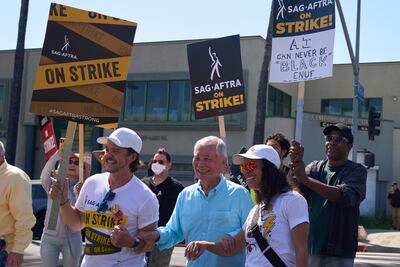Three quarters of the UK’s film and TV industry staff are currently out of work as a result of the Hollywood strikes, a new survey has found.
Thousands of workers have been affected by the strike in the UK, with The National told that many highly experienced and skilled workers are now stacking shelves or working in bars to make ends meet.
The UK is the third-largest centre for film production in the world and has been particularly badly hit by the strikes, with thousands of workers, almost all of whom are freelance, laid off.
The dispute began when the Writers' Guild of America went on strike at the beginning of May after their demands for better pay and protections against the future use of artificial intelligence in TV and film were not met.
The Screen Actors Guild-American Federation of Television and Radio Artists, or SAG-AFTRA, which represents 160,000 performers, including A-list stars, then followed suit for similar reasons.
The extent to which the strike has affected the UK has been revealed in a survey carried out by the Bectu union, which represents workers in film, TV and theatre.
Will Jasper, a first assistant director, said he was working on Disney’s A Thousand Blows until two months ago, when the effects of the strike began to kick in.
He said that typically, he would have had work lined up a couple of weeks before a job finished but he has not been able secure anything.
“I know big, well-established people who have had to get jobs outside the industry,” the 46-year-old told The National.
“Some of them are working in pubs and stacking shelves because they’ve got mortgages to pay.
“This is affecting a group of people who, when Covid hit, were given no help from the government. So two years after being out of work, we’re all out of work again.
“It’s not just superstar writers and actors who are affected – everyone in the British film industry is out of work.”

Among the films in production hit by the strike is the latest Mission: Impossible film, which was in production at Longcross studios. Along with other normally busy studios, Longcross has been left deserted during the strike.
According to the Bectu survey, 80 per cent of workers have had their employment directly affected by the US disputes.
Nine in 10 are worried about their financial security, and 60 per cent reported struggling with their mental health as a result of financial concerns.
The recent experiences of film industry workers contributed to an 800 per cent increase in applications to the hardship fund of the Film and TV Charity last month, compared to the same time last year.
Speaking about his own situation Mr Jasper said: “I have zero income and don’t expect to have any income until the rest of the year.
“I’ve cut everything non-essential out of my life. It’s dramatically affected my life.”

While Britain's performing arts and entertainment trade union, Equity, has staged protests in sympathy with its US counterpart, it is prevented from striking under laws that forbid “secondary action” aimed at supporting other walkouts.
Bectu head Philippa Childs said many workers have been laid off from productions under “force majeure” clauses with little notice or pay.
“The impact on crew and other film and TV workers is severe and cannot be underestimated,” she said.
“For too long we have seen a pattern of engaging crew where they are picked up and dropped again with little notice, protection or reassurances about future employment.
“They are often the first to suffer and the hardest hit when production is impacted.”

Ms Childs said the strike is a dispute with “many of the same employers who frequently undervalue crew in the UK”.
While there is “solidarity with US actors and writers is important for raising standards domestically and globally”, there is “no getting around the very real and devastating impact on UK workers”.
“The government is vocal about the huge cultural and economic value of the creative industries,” she said.
“It must put its money where its mouth is and look after those who work in the sector.
“Likewise urgent industry collaboration and commitment from employers to support the freelance workforce is critical if we want to UK to remain a cultural hub.”


